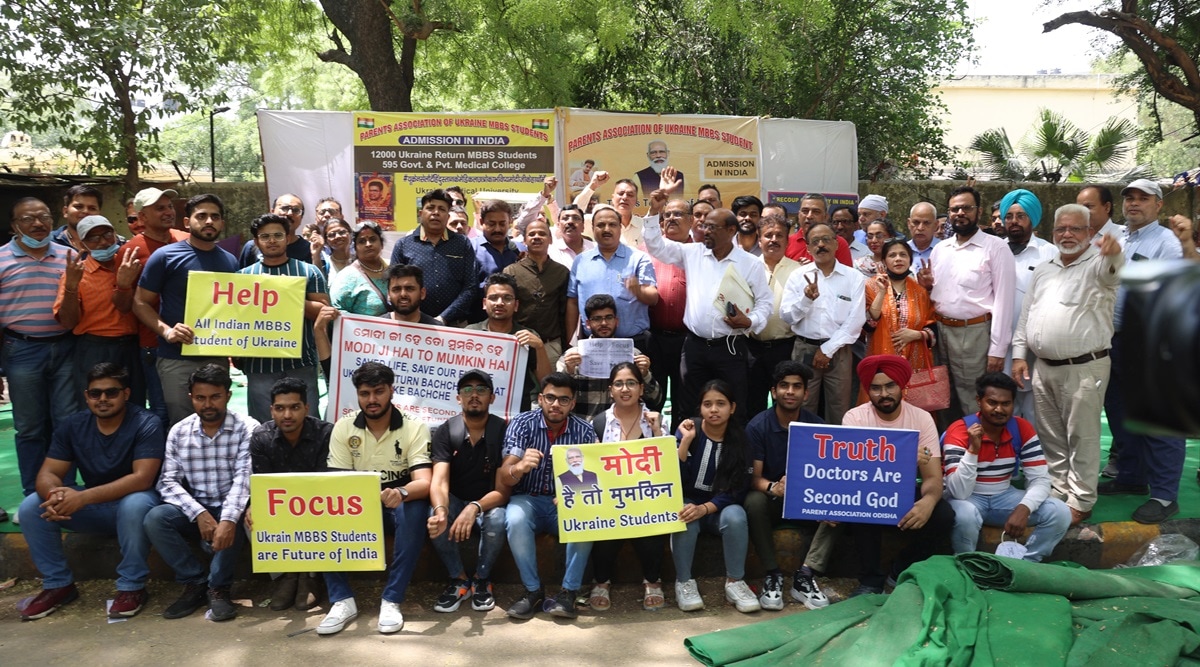 Roshan Motiram Gunjal writes: The distress of witnessing an invasion, undergoing an evacuation and experiencing academic insecurity has impacted my education in more ways than I can count. (Express file photo by Amit Mehra)
Roshan Motiram Gunjal writes: The distress of witnessing an invasion, undergoing an evacuation and experiencing academic insecurity has impacted my education in more ways than I can count. (Express file photo by Amit Mehra)Written by Roshan Motiram Gunjal
On February 24, when Ukraine was invaded by Russian troops, I experienced a grave loss of safety – personally and professionally. The deep-seated fear created then has since become a looming presence in my life, even seven months after my evacuation from Chernivtsi.
The last semester of the second year of my medical degree ends this December. Post that, we are disallowed from attending classes online since the third year of an MBBS degree concentrates on practical skills. Even now, the nature of my degree is such that online classes do not suffice. So far, there has been no official statement with regard to our academic future in the country by either the central government or the National Medical Commission. This prolonged uncertainty compounded by the experiences this February has left me distraught.
On our arrival in India, central government ministers had come to receive us at the airport. We were told, “Don’t worry. We can accommodate all of you in India. You don’t have to go to ‘small countries’ to pursue an education.” After the quick evacuation, thanks to Mission Ganga, I put my faith in this country’s government to secure my future, so rudely snatched away due to a humanitarian crisis.
After months of exercising faith in Indian authorities — clearly, to no avail — I was forced to file a petition against the National Medical Commission (NMC) with the Supreme Court in hopes of the process getting expedited. That too has been met with disappointment. The delay in the matter’s listing gave me the impression that there was a lack of concern for the hundreds of students whose futures are hanging in the balance, like mine. We were also given no relaxation from the government’s end, despite having lived through such extraordinary circumstances while in Ukraine. Additionally, on September 15, the Centre told the courts that we simply cannot be accommodated in medical universities in India.
With some of my seniors returning to Ukraine and no guidelines back home, my parents and I recently discussed my options. For my third year, I plan to head back for now. At the mention of the idea, my mother said, “After watching live telecasts of troops invading Ukraine with my child stuck in the country, I cannot get myself to tell you to go back.” To me, and my family, this is not just a matter of education, but safety. I expected my country to be able to provide me with both.
The distress of witnessing an invasion, undergoing an evacuation and experiencing academic insecurity has impacted my education in more ways than I can count. There is constant chaos surrounding me — parents’ associations, legal battles, elevating anxieties. How is a student supposed to focus amid all of this? Indian authorities have had more than enough time to contemplate. Why we are not being afforded the decency of mere clarity — this way or that — is lost on me.
The prospect of transferring my degree to another university abroad also seems bleak. Applying anywhere else in Europe would mean that I would have to learn a different language from scratch, yet again, simultaneous to my studies. I would also have to appear for examinations tailor-made for the specific countries I would apply to, and owing to technicalities, will likely have to repeat a semester. At this point, that seems like a loss I am willing to take. The larger apprehension, however, is about security. The situation in Europe is tumultuous and the fear of the recent upheaval repeating itself is gnawing at me.
At the end of the day though, it boils down to this: The safety of your home country is incomparable. I wonder how much longer it’ll take, if at all, for the country to promise me just that — safety.
(The writer is a second-year medical student at Bukovinian State Medical University, Chernivtsi. He is one of the students who has filed a petition in the Supreme Court seeking permission to continue their medical studies in India)